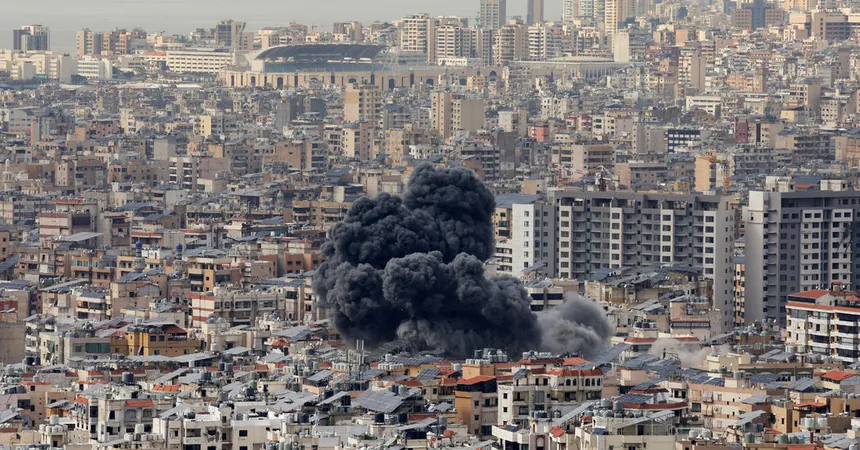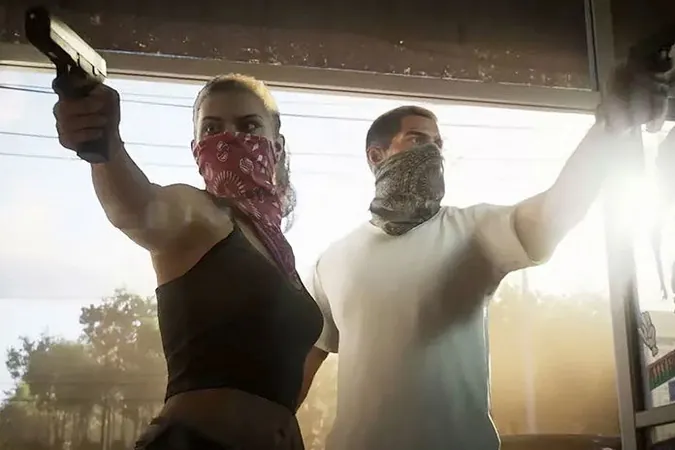
Tensions Escalate: Israel Conducts Airstrikes Near Beirut, Shattering Months of Calm
2025-03-28
Author: Ting
Introduction
In a shocking development, the Israeli military has launched airstrikes in the southern outskirts of Beirut for the first time since a U.S.-brokered cease-fire was established back in November 2023. This unprecedented action has shattered months of fragile peace in the Lebanese capital and has raised alarms about a possible escalation of the ongoing conflict in the region.
Triggering Incident
The military operation was triggered earlier on Friday when rockets were fired from Lebanese territory at northern Israel, setting off air-raid sirens in multiple communities close to the border. In response, the Israeli military ordered an evacuation of residents living in the densely populated Hadath neighborhood of Dahiya, which is located on the southern periphery of Beirut.
Israeli Response
Shortly after these warnings were issued, Israeli airstrikes commenced, targeting a site believed to store Hezbollah's drones. While the Israeli military has not directly blamed Hezbollah for the earlier rocket fire, the militant group quickly denied any involvement, reaffirming its commitment to the cease-fire.
Concern Over Escalation
However, this marked the second such crossfire incident in less than a week, increasing concerns that the fragile truce between Israel and Hezbollah could collapse. Reports indicate that at least three individuals were killed in the recent Israeli airstrikes in southern Lebanon, according to the Lebanese health ministry, which does not differentiate between civilians and combatants in its reports.
Investigation and Implications
The Lebanese military is currently conducting investigations into the origin of the rocket fire. Experts suggest that Hezbollah, which is still reeling from the extensive 14-month conflict with Israel, is unlikely to provoke a full-scale war at this time. Nevertheless, Palestinian armed groups, such as Hamas, have established a significant presence in Lebanon, often launching attacks from long-standing refugee camps. Since the outbreak of war in Gaza following the Hamas-led attack on October 7, 2023, Hezbollah has actively engaged in firing rockets and drones into Israeli territory in a show of solidarity.
Humanitarian Impact
This recent surge in violence comes after nearly a year of low-intensity clashes that escalated dramatically with a full-scale ground invasion by Israel into Gaza. The humanitarian toll has been devastating, marking Lebanon's deadliest conflict since the end of its 15-year civil war in 1990.
Statements from Israeli Leadership
Israeli Prime Minister Benjamin Netanyahu has announced a relentless commitment to "strongly enforce" the cease-fire terms, which require the Lebanese government to take preventive measures against militant groups targeting Israel. "The equation has changed," Netanyahu asserted, emphasizing, "We will not allow any attacks on our communities — not even a trickle."
Evacuation and Public Reaction
In the aftermath of the evacuation orders, fears gripped the city as surveillance drones buzzed overhead, and gunfire resounded in Dahiya. Panic ensued as residents rushed to alert their neighbors about the imminent threat of an Israeli strike. Schools in nearby areas were ordered to close, and frantic parents rushed to pick up their terrified children. Students reported being evacuated away from windows, with many classmates succumbing to fear and anxiety reminiscent of the war's most intense periods, when Israeli airstrikes routinely targeted Beirut's southern outskirts.
Global Perspectives
As tensions simmer in the region, the international community watches closely, fearing that the fragile calm in Lebanon could soon give way to renewed violence. The situation remains fluid, and the potential for further conflict looms large as diplomatic efforts to stabilize the region continue to be paramount.



 Brasil (PT)
Brasil (PT)
 Canada (EN)
Canada (EN)
 Chile (ES)
Chile (ES)
 Česko (CS)
Česko (CS)
 대한민국 (KO)
대한민국 (KO)
 España (ES)
España (ES)
 France (FR)
France (FR)
 Hong Kong (EN)
Hong Kong (EN)
 Italia (IT)
Italia (IT)
 日本 (JA)
日本 (JA)
 Magyarország (HU)
Magyarország (HU)
 Norge (NO)
Norge (NO)
 Polska (PL)
Polska (PL)
 Schweiz (DE)
Schweiz (DE)
 Singapore (EN)
Singapore (EN)
 Sverige (SV)
Sverige (SV)
 Suomi (FI)
Suomi (FI)
 Türkiye (TR)
Türkiye (TR)
 الإمارات العربية المتحدة (AR)
الإمارات العربية المتحدة (AR)